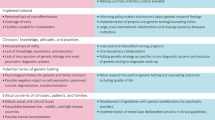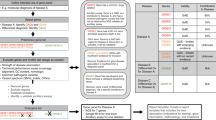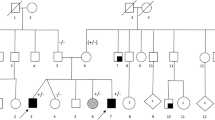Abstract
In the past two decades, the number of genes recognized to have a role in the epilepsies has dramatically increased. The availability of testing for epilepsy-related genes is potentially helpful for clarification of the diagnosis and prognosis, selection of optimal treatments, and provision of information for family planning. For some patients, identification of a specific genetic cause of their epilepsy has important personal value, even in the absence of clear clinical utility. The availability of genetic testing also raises new issues that have only begun to be considered. These issues include the growing importance of educating physicians about when and how to test patients, the need to ensure that affected individuals and their families can make informed choices about testing and receive support after receiving the results, and the question of what the positive and negative consequences of genetic testing will be for affected individuals, their family members, and society.
This is a preview of subscription content, access via your institution
Access options
Subscribe to this journal
Receive 12 print issues and online access
$209.00 per year
only $17.42 per issue
Buy this article
- Purchase on Springer Link
- Instant access to full article PDF
Prices may be subject to local taxes which are calculated during checkout
Similar content being viewed by others
References
Thomas, R. H. & Berkovic, S. F. The hidden genetics of epilepsy—a clinically important new paradigm. Nat. Rev. Neurol. http://dx.doi.org/10.1038/nrneurol.2014.62
Pal, D. K., Pong, A. W. & Chung, W. K. Genetic evaluation and counseling for epilepsy. Nat. Rev. Neurol. 6, 445–453 (2010).
Pong, A. W., Pal, D. K. & Chung, W. K. Developments in molecular genetic diagnostics: an update for the pediatric epilepsy specialist. Pediatr. Neurol. 44, 317–327 (2011).
Ottman, R. et al. Genetic testing in the epilepsies—report of the ILAE Genetics Commission. Epilepsia 51, 655–670 (2010).
Hirose, S. et al. SCN1A testing for epilepsy: application in clinical practice. Epilepsia 54, 946–952 (2013).
Sheidley, B. R. & Poduri, A. Genetics in clinical epilepsy: issues in genetic testing and counseling. J. Pediatr. Epilepsy 1, 135–142 (2012).
Hildebrand, M. S. et al. Recent advances in the molecular genetics of epilepsy. J. Med. Genet. 50, 271–279 (2013).
Scheffer, I. E. Genetic testing in epilepsy: what should you be doing? Epilepsy Curr. 11, 107–111 (2011).
Epi4K Consortium & Epilepsy Phenome/Genome Project. De novo mutations in epileptic encephalopathies. Nature 501, 217–221 (2013).
Yu, T. W. et al. Using whole-exome sequencing to identify inherited causes of autism. Neuron 77, 259–273 (2013).
Alkuraya, F. S. The application of next-generation sequencing in the autozygosity mapping of human recessive diseases. Hum. Genet. 132, 1197–1211 (2013).
Martin, H. C. et al. Clinical whole-genome sequencing in severe early onset epilepsy reveals new genes and improves molecular diagnosis. Hum. Mol. Genet. http://dx.doi.org/10.1093/hmg/ddu030.
Database of Genomic Variants [online], (2014).
Petrovski, S., Wang, Q., Heinzen, E. L., Allen, A. S. & Goldstein, D. B. Genic intolerance to functional variation and the interpretation of personal genomes. PLoS Genet. 9, e1003709 (2013).
PolyPhen-2: prediction of functional effects of human nsSNPs [online], (2014).
J. Craig Venter Institute. SIFT [online], (2014).
The 1,000 Genomes Project: a deep catalog of human genetic variation [online], (2014).
National Heart Lung Blood Institute (NHLBI). Exome Sequencing Project (ESP) Exome Variant Server (EVS) [online] (2014).
Brunklaus, A. et al. The clinical utility of an SCN1A genetic diagnosis in infantile-onset epilepsy. Dev. Med. Child. Neurol. 55, 154–161 (2013).
Lemke, J. R. et al. Targeted next generation sequencing as a diagnostic tool in epileptic disorders. Epilepsia 53, 1387–1398 (2012).
Carvill, G. L. et al. Targeted resequencing in epileptic encephalopathies identifies de novo mutations in CHD2 and SYNGAP1. Nat. Genet. 45, 825–830 (2013).
Veeramah, K. R. et al. Exome sequencing reveals new causal mutations in children with epileptic encephalopathies. Epilepsia 54, 1270–1281 (2013).
Peljto, A. L. et al. Familial risk of epilepsy: a population-based study. Brain 137, 795–805 (2014).
Vadlamudi, L. et al. Epilepsy in twins: insights from unique historical data of William Lennox. Neurology 62, 1127–1133 (2004).
Berkovic, S. F., Howell, R. A., Hay, D. A. & Hopper, J. L. Epilepsies in twins: genetics of the major epilepsy syndromes. Ann. Neurol. 43, 435–445 (1998).
Corey, L. A. et al. The occurrence of epilepsy and febrile seizures in Virginian and Norwegian twins. Neurology 41, 1433–1436 (1991).
Kjeldsen, M. J., Corey, L. A., Christensen, K. & Friis, M. L. Epileptic seizures and syndromes in twins: the importance of genetic factors. Epilepsy Res. 55, 137–146 (2003).
Klassen, T. et al. Exome sequencing of ion channel genes reveals complex profiles confounding personal risk assessment in epilepsy. Cell 145, 1036–1048 (2011).
Shostak, S., Zarhin, D. & Ottman, R. What's at stake? Genetic information from the perspective of people with epilepsy and their family members. Soc. Sci. Med. 73, 645–654 (2011).
Lehmann, A., Speight, B. S. & Kerzin-Storrar, L. Extended family impact of genetic testing: the experiences of X-linked carrier grandmothers. J. Genet. Couns. 20, 365–373 (2011).
Douglas, H. A., Hamilton, R. J. & Grubs, R. E. The effect of BRCA gene testing on family relationships: a thematic analysis of qualitative interviews. J. Genet. Couns. 18, 418–435 (2009).
Burke, W., Pinsky, L. E. & Press, N. A. Categorizing genetic tests to identify their ethical, legal, and social implications. Am. J. Med. Genet. 106, 233–240 (2001).
Jacoby, K. & Jacoby, A. Epilepsy and insurance in the UK: an exploratory survey of the experiences of people with epilepsy. Epilepsy Behav. 5, 884–893 (2004).
Baruch, S. & Hudson, K. Civilian and military genetics: nondiscrimination policy in a post-GINA world. Am. J. Hum. Genet. 83, 435–444 (2008).
Helbig, K. L. et al. Genetic risk perception and reproductive decision making among people with epilepsy. Epilepsia 51, 1874–1877 (2010).
Hammond, C. L., Thomas, R. H., Rees, M. I., Kerr, M. P. & Rapport, F. Implications for families of advances in understanding the genetic basis of epilepsy. Seizure 19, 675–679 (2010).
Gehlert, S., DiFrancesco, A. & Chang, C. H. Black–white differences in the psychosocial outcomes of epilepsy. Epilepsy Res. 42, 63–73 (2000).
Jacoby, A. Stigma, epilepsy, and quality of life. Epilepsy Behav. 3, S10–S20 (2002).
Jacoby, A., Gorry, J., Gamble, C. & Baker, G. A. Public knowledge, private grief: a study of public attitudes to epilepsy in the United Kingdom and implications for stigma. Epilepsia 45, 1405–1415 (2004).
Morrell, M. Stigma and epilepsy. Epilepsy Behav. 3, S21–S25 (2002).
Scambler, G. Health-related stigma. Sociol. Health Illn. 31, 441–455 (2009).
Schneider, J. W. & Conrad, P. Having Epilepsy: the Experience and Control of Illness (Temple University Press, 1983).
Bennett, L., Thirlaway, K. & Murray, A. J. The stigmatising implications of presenting schizophrenia as a genetic disease. J. Genet. Couns. 17, 550–559 (2008).
Phelan, J. C. Geneticization of deviant behavior and consequences for stigma: the case of mental illness. J. Health Soc. Behav. 46, 307–322 (2005).
Mehta, S. I. & Farina, A. Associative stigma: perceptions of the difficulties of college-aged children of stigmatized fathers. J. Social Clin. Psychol. 7, 192–202 (1988).
Goffman, E. Stigma: Notes on the Management of Spoiled Identity (Prentice Hall, 1963).
Feero, W. G. Genetics of common disease: a primary care priority aligned with a teachable moment? Genet. Med. 10, 81–82 (2008).
Burke, W. & Emery, J. Genetics education for primary-care providers. Nat. Rev. Genet. 3, 561–566 (2002).
Feero, W. G. & Green, E. D. Genomics education for health care professionals in the 21st century. JAMA 306, 989–990 (2011).
Core Competency Working Group of the National Coalition for Health Professional Education in Genetics. Recommendations of core competencies in genetics essential for all health professionals. Genet. Med. 3, 155–159 (2001).
Kemper, A. R. et al. A blueprint for maternal and child health primary care physician education in medical genetics and genomic medicine: recommendations of the United States Secretary for Health and Human Services Advisory Committee on heritable disorders in newborns and children. Genet. Med. 12, 77–80 (2010).
Kang, P. B. Ethical issues in neurogenetic disorders. Handb. Clin. Neurol. 118, 265–276 (2013).
Salm, M. et al. Use of genetic tests among neurologists and psychiatrists: knowledge, attitudes, behaviors, and needs for training. J. Genet. Couns. 23, 156–163 (2014).
Green, R. C. et al. ACMG recommendations for reporting of incidental findings in clinical exome and genome sequencing. Genet. Med. 15, 565–574 (2013).
Burke, W. et al. Recommendations for returning genomic incidental findings? We need to talk! Genet. Med. 15, 854–859 (2013).
Holtzman, N. A. ACMG recommendations on incidental findings are flawed scientifically and ethically. Genet. Med. 15, 750–751 (2013).
McGuire, A. L. et al. Point–counterpoint. Ethics and genomic incidental findings. Science 340, 1047–1048 (2013).
Wolf, S. M., Annas, G. J. & Elias, S. Point–counterpoint. Patient autonomy and incidental findings in clinical genomics. Science 340, 1049–1050 (2013).
Ghanean, H., Nojomi, M. & Jacobsson, L. Public awareness and attitudes towards epilepsy in Tehran, Iran. Glob. Health Action 6, 21618 (2013).
Keikelame, M. J. & Swartz, L. A lay carer's story about epilepsy in an urban South African context: they call it an illness of falling or an illness of fitting because a person shakes and eventually falls. Epilepsy Behav. 28, 512–518 (2013).
Good, B. J. & Del Vecchio Good, M. J. In the subjunctive mode: epilepsy narratives in Turkey. Soc. Sci. Med. 38, 835–842 (1994).
Fadiman, A. The Spirit Catches You and You Fall Down: a Hmong Child, her American Doctors, and the Collision of Two Cultures (Farrar Straus and Giroux, 1997).
Whitmarsh, I. Biomedical Ambiguity: Race, Asthma, and the Contested Meaning of Genetic Research in the Caribbean (Cornell University Press, 2008).
Rapp, R. Testing Women, Testing the Fetus: the Social Impact of Amniocentesis in America (Routledge, 1999).
McAllister, M. Personal theories of inheritance, coping strategies, risk perception and engagement in hereditary non-polyposis colon cancer families offered genetic testing. Clin. Genet. 64, 179–189 (2003).
d'Agincourt-Canning, L. A gift or a yoke? Women's and men's responses to genetic risk information from BRCA1 and BRCA2 testing. Clin. Genet. 70, 462–472 (2006).
Shostak, S. & Ottman, R. Ethical, legal, and social dimensions of epilepsy genetics. Epilepsia 47, 1595–1602 (2006).
Taylor, J., Baker, G. A. & Jacoby, A. Levels of epilepsy stigma in an incident population and associated factors. Epilepsy Behav. 21, 255–260 (2011).
Leaffer, E. B. et al. Associates of stigma in an incident epilepsy population from northern Manhattan, New York City. Epilepsy Behav. 21, 60–64 (2011).
Fernandes, P. T., Snape, D. A., Beran, R. G. & Jacoby, A. Epilepsy stigma: what do we know and where next? Epilepsy Behav. 22, 55–62 (2011).
Austin, J. K. et al. Self-esteem and symptoms of depression in children with seizures: relationships with neuropsychological functioning and family variables over time. Epilepsia 51, 2074–2083 (2010).
Hermann, B. & Jacoby, A. The psychosocial impact of epilepsy in adults. Epilepsy Behav. 15 (Suppl. 1), S11–S16 (2009).
Jacoby, A. Epilepsy and stigma: an update and critical review. Curr. Neurol. Neurosci. Rep. 8, 339–344 (2008).
Scambler, G. Patient perceptions of epilepsy and of doctors who manage epilepsy. Seizure 3, 287–293 (1994).
Acknowledgements
The authors acknowledge grant support from the NIH, including K23 NS069784 (to A.P.), R01 NS078419 (to R.O. and S.S.), and U01 NS077276, U01 NS077367, and P50 HG007257 (to R.O.).
Author information
Authors and Affiliations
Contributions
All authors contributed equally to all aspects of the manuscript, including researching data for the article, writing the initial draft, review or editing of the manuscript before submission, and discussion of its content.
Corresponding author
Ethics declarations
Competing interests
The authors declare no competing financial interests.
PowerPoint slides
Rights and permissions
About this article
Cite this article
Poduri, A., Sheidley, B., Shostak, S. et al. Genetic testing in the epilepsies—developments and dilemmas. Nat Rev Neurol 10, 293–299 (2014). https://doi.org/10.1038/nrneurol.2014.60
Published:
Issue Date:
DOI: https://doi.org/10.1038/nrneurol.2014.60
This article is cited by
-
Genetic exploration of Dravet syndrome: two case report
Journal of Medical Case Reports (2024)
-
Molecular tools for the genomic assessment of oocyte’s reproductive competence
Journal of Assisted Reproduction and Genetics (2022)
-
Genome sequencing broadens the range of contributing variants with clinical implications in schizophrenia
Translational Psychiatry (2021)
-
Genetic Testing in Pediatric Epilepsy
Indian Journal of Pediatrics (2021)
-
Gene tests in adults with epilepsy and intellectual disability
Nature Reviews Neurology (2020)



